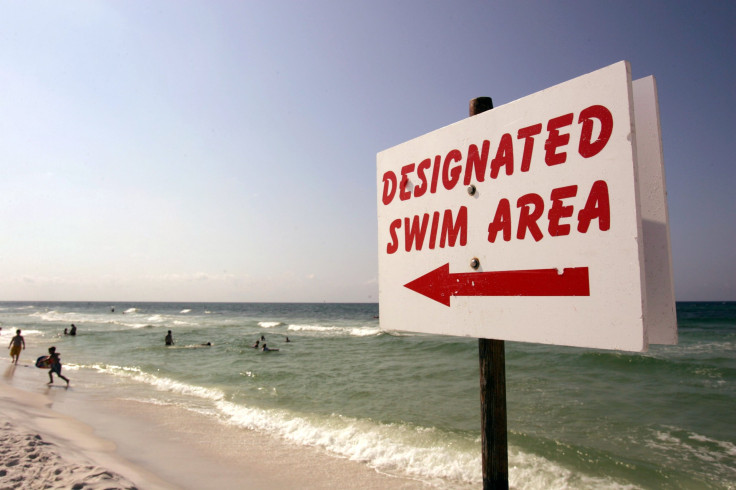Shark Attacks Swimmer Off Florida's Haulover Beach, Suspected Bull Shark Bites Legs

A suspected bull shark attacked a swimmer Sunday afternoon off Florida's Haulover Beach in Miami-Dade County, reports said. The shark reportedly bit the man's legs in the first recorded shark attack case at Haulover Beach, nine miles north of Miami Beach.
Miami-Dade Fire Rescue Ocean Rescue lifeguards said they spotted the shark lurking in the water and immediately alerted the people. “In the process of exiting the water, a beachgoer was bitten in the lower extremities by what appeared to be a 4-to-5 foot bull shark,” Miami-Dade Fire Rescue spokeswoman Erika Benitez said. “The person was able to get out of the water, and MDFR Ocean Rescue lifeguards immediately rendered assistance."
Read: Sharks Surprise Tourists In Shallow Water At Florida Beach
Benitez also gave some safety tips while talking about the latest incident. "Always swim near manned lifeguard towers and be sure to always heed all warnings issued by lifeguards," he said.
The injured man, who has not been identified, was taken to Aventura Hospital, Benitez said. While the extent of the injuries on the man's legs were unknown, first responders said the injuries did not appear to be life threatening. Officials said they closed the beach as precaution following the incident.
shark attack at haulover beach Sunday afternoon. mans lower legs injured. pic courtesy Rob Boyte. @wsvn #sharkattack #haulover #beach pic.twitter.com/V7pVg9HVue
— Ann Keil Dux (@AnnKeilDux) July 10, 2017
"Although these incidents are rare, we still ask beachgoers to always be aware of their surroundings," Lt. Matt Sparling told ABC-affiliate WPLG-TV. "In my 20 years as a lifeguard, this is the first time a person has been bitten here at Haulover Beach, and possibly the first for Miami-Dade County."
“After some research, I’ve never seen an unprovoked shark attack in Miami-Dade County. Broward’s had a few, and the state of Florida is the shark attack capital of the world, but it tends to be north in the Palm Beaches, Vero [Beach, areas like New Smyrna Beach,” he added.
witness taking this picture as water was being evacuated. shark seemingly in view. courtesy Rob Boyte. @wsvn #sharkattack #haulover #beach pic.twitter.com/yItr4OmXjK
— Ann Keil Dux (@AnnKeilDux) July 10, 2017
In January, the University of Florida's International Shark Attack File said that unprovoked shark attacks across the world dropped after a record-breaking number in 2015. There were 81 unprovoked attacks in 2016, well down from 98, the previous year. Four of the 2016 attacks — two in Australia and two in the French territory of New Caledonia — were fatal. According to its official website, ISAF is "the only globally-comprehensive, scientific shark attack database in the world."
"A shark attack is a human phenomenon," file curator George Burgess said. "Sharks are a natural part of the ecosystem. The ocean is a foreign environment to humans, and when we enter the sea, we're entering a wilderness."
In 2015, Florida saw 32 shark attacks up from 30 in 2015, with Volusia County, the state's shark-attack capital, recording 15 attacks, the largest number. Most of the shark incidents in Florida involved bull sharks, tiger sharks and great white sharks.
Read: Drone Video Captures Giant Hammerhead Shark Struggling With Fisherman In Florida
According to an article on the Florida Museum of Natural History website, a shark attack can be avoided by observing certain rules. Here are some tips to remember.
1. Choose to swim in a group as sharks most often attack lone individuals.
2. Don't wander too far from the shore as it may get difficult to get assistance if attacked by a shark.
3. Avoid the water at night, dawn, or dusk as sharks are most active at these times.
4. In case you have a cut or you are bleeding, do not enter the water as sharks can smell and taste blood, and trace it back to its source.
5. Avoid wearing shiny jewelry as the reflected light looks like shining fish scales.
6. Leave the water immediately if you spot a shark.
7. Avoid going into waters containing sewage as it attracts bait fishes, which in turn attract sharks.
8. Don't splash a lot in water. Erratic movements can attract sharks.
9. Don't try to touch a shark if you see one.
10. If attacked by a shark, do whatever it takes to get away from it.
© Copyright IBTimes 2025. All rights reserved.





















